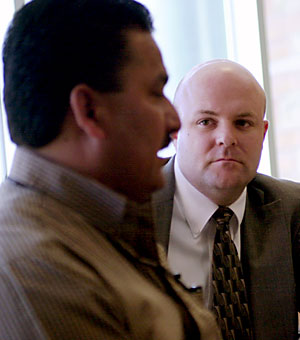 |
|
WILL SEBERGER/Arizona Daily Wildcat
|
Miguel Angel Rios Mendez, left, a state defense attorney for Sonora, Mexico, speaks with U.S. Consular Section Chief Benjamin Ousley about the legal troubles that can befall spring-breakers in Mexico.
|
|
|
By Jessica Lee
Arizona Daily Wildcat
Friday, February 27, 2004
Print this
For students gearing up to party up in Rocky Point this spring break, a new law may step on their sandal-clad toes as drinking in the streets is now prohibited.
Chugging beer outside a bar or private residence could land students an administrative fine of about $20 or possible jail time if they get caught by the police.
The new law, along with other spring break concerns, was discussed yesterday at a meeting among Arizona and Mexico representatives and UA officials.
The meeting's focus was to teach students how to have fun and stay safe while partying during the break.
"The goal here today is about prevention and safety for students," said Associate Dean of Students Veda Kowalski.
Rocky Point, or Puerto Peľasco, is a city located approximately four hours from Tucson in the Mexican state of Sonora. For decades, Americans have ventured to the ocean town to vacation.
Representatives at the meeting came from the American Consulate, U.S. Customs and Border Protection, the Tucson Police Department, UAPD, Campus Health Service, the Dean of Students, Residence Life and the Center for Student Leadership and Involvement.
Benjamin Ousley, consular section chief within the U.S. Consulate, said Rocky Point can expect some 75,000 Americans during spring break. All three Arizona universities have the same spring break this year.
"We are expecting this to be a peak year," Ousley said. With the upswing in the economy and the loss of war jitters, more Americans will likely drive down to enjoy time outside of the country, Ousley said.
Differences in customs and laws often lead Americans into legal problems.
For instance, if an American is involved in an auto accident, the police will hold all members involved, regardless of guilt, until they can prove they have adequate financial backing, either through Mexican auto insurance or cash.
If the accident occurs while driving under the influence of alcohol or other drugs, it will invalidate the insurance.
Although there is not a blood alcohol limit that determines whether a person is legally intoxicated, Mexican police use Breathalyzers and other clinical observations to determine whether someone is drunk, said Miguel Angel Rios Mendez, a state defense attorney for Sonora.
Fighting, indecent exposure and urinating in public can result in minor fines.
Rape and possession of any weapons or illegal drugs, including medicine without a prescription, are serious crimes in Mexico and can bring prison sentences.
For serious criminal acts in Mexico, suspects are considered guilty until proven innocent and may not have the option of posting bond.
Those who deal with law enforcement and safety have been planning for the types of crimes and injuries that occur during spring break every year.
"In Rocky Point, we usually see about 50 arrests a night," said Kristin Hagerstrom, consul for the U.S. Consulate in Nogales, Mexico.
Last year, along state Routes 85 and 86, there were 22 medical emergencies, resulting in 17 people being flown away by helicopter.
"We were lucky because there were no fatalities last year," said Hugh Winderweedle, port director in Lukeville, Ariz.
UA representatives at yesterday's meeting hope to help educate students before they go to Mexico.
Beth Conder, coordinator of Greek Life programs, attended the meeting so she can spread information to sororities, fraternities and campus clubs.
"Every year, we try to put together information to educate students how to be safe," Conder said.
Campus Health has published a brochure solely to give students information on how to have a safe time in Mexico.
International students interested in the Rocky Point scene should check with the Office of International Programs and Services to ensure they have proper documentation.
Kowalski and other campus officials plan to send out Rocky Point information in the next couple weeks, but students with questions can call the office anytime at 621-7059.
Many representatives encouraged students to make copies of all documents and minimize their risk by leaving behind nonessential valuables.
Cell phones will only work in Rocky Point if the customer has requested international roaming.
Students planning to vacation in Rocky Point should visit travel.state.gov.
Mexico-goers could see unusually long lines at the border at Lukeville, although the average time to cross the border is approximately 20 to 30 minutes, Winderweedle said. Border crossing times can be accessed at dhs.gov.
